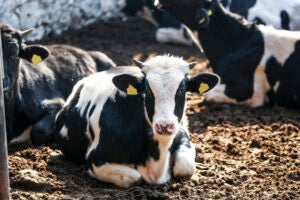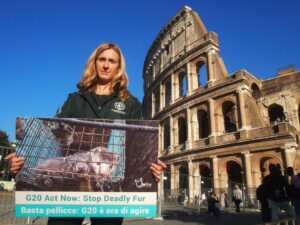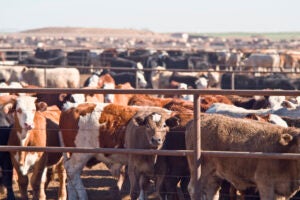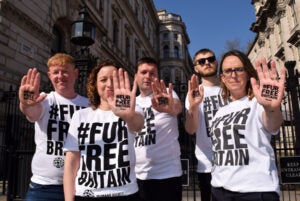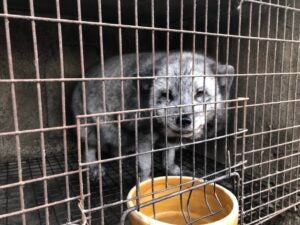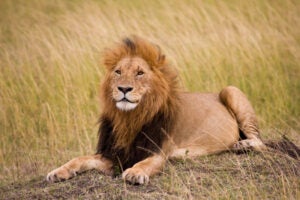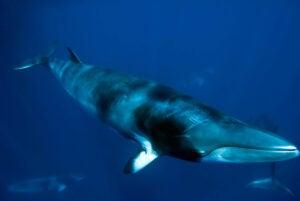
GLASGOW—Some of the world’s biggest plant-based food manufacturers and investors including Beyond Investing, Eat Just, Linda McCartney Foods and Wicked Kitchen have added their voice to #TheCowInTheRoom campaign at the COP26 climate change conference, calling on world leaders to stop ignoring animal agriculture in climate change mitigation policies and targets. The letter comes as a new YouGov opinion poll shows that over half of Brits (51%) would support the UK government initiating a joint campaign with supermarkets and food service / retail companies to actively promote the benefits of plant-based foods.
In an open letter to COP26 presented at the conference by Humane Society International, together with ProVeg International and Buddhist Tzu Chi Foundation, 16 companies urge world leaders to include animal agriculture, and meat and dairy reduction targets, in formal COP26 discussions. A citizen petition of over 70,000 signatures was also submitted to COP26 by the campaigners, with the backing of some of the world’s biggest celebrities including Joaquin Phoenix, Moby, Billie Eilish, Alan Cumming, Alicia Silverstone, Leona Lewis, Lily Cole and Stephen Fry.
Claire Bass, executive director of Humane Society International/UK, said from COP26: “We simply cannot afford to ignore the cow in the room any longer—the science is clear that targets to reduce meat and dairy production and consumption are crucial if we are to meet internationally agreed upon climate targets. But while there is clear consumer and corporate appetite for a plant-based shift, politicians appear to be asleep at the wheel, failing to grasp both the urgent need and multiple opportunities to catalyse the normalisation of plant-centric diets. The Methane Pledge is a prime example of this; to reduce this potent GHG we simply need fewer cows, not just technological fixes that produce slightly less burpy cows.”
The food system is responsible for 30% of the European Union’s greenhouse gas emissions, of which 17% is attributable to livestock production. Moving to more plant-rich diets could decrease the EU’s carbon footprint by 50%.
ProVeg says European meat and dairy reduction targets should be bold to achieve Europe’s climate goals. Based on leading research, ProVeg calculates that by 2040:
- The consumption of meat needs to be reduced by 79%.
- The consumption of milk and dairy needs to be reduced by between 74 and 83%.
- The consumption of eggs needs to be reduced by 68%.
- The consumption of fish and seafood needs to be reduced by 65%.
Jasmijn de Boo, vice-president at ProVeg International, comments: “The urgency of reducing our global intake of meat, fish, eggs and dairy to tackle the climate crisis must be addressed, especially now that world leaders have reached an agreement during COP26 to tackle deforestation, and set a 30% methane reduction target. We need to move towards more plant-rich diets now to save our forests and to save the planet. If Europe is to achieve its climate goals by 2030, it will have to reduce the current intake of meat by 79% and incentivise the consumption of plant-rich diets. We need to go further and show leadership in order to have a just and fair global transition to more plant-based food production and consumption.”
Dr. Ming-nan Lin from the Buddhist Tzu Chi Foundation and vice superintendent of Dalin Tzu Chi General Hospital, comments: “Global leaders and the private sector must engage with faith leaders and community partners to inspire respect for all life, with compassion and love. There are clear connections between human health and planetary health. Zoonosis, vector-borne diseases, and certain non-communicable diseases such as diabetes and heart disease have inextricable links to our dietary habits. The public health benefits of a transition towards a plant-centric food system has undeniable co-benefits to the health and wellbeing of the planet as well.”
The animal agriculture industry breeds, raises and slaughters more than 88 billion land animals globally every year. The industry’s emissions—a staggering 20% of all human-caused greenhouse gas emissions–are on par with those emitted by the entire global transportation sector, and yet targets and strategies to reduce meat and dairy production and consumption are absent from climate change discussions.
Scientists, too, are calling for the need to transform our global food system into one that supports and protects planetary and human health. The 107 experts who prepared the report for the UN’s Intergovernmental Panel on Climate Change determined with high confidence that policies operating across the food system, including policies that influence dietary choices, would enable more sustainable land-use management, result in enhanced food security and low emissions trajectories, contribute to climate change adaptation and mitigation, and improve public health.
Notes to editor:
- Data on mentioned reduction targets can be found here.
- Survey figures are from YouGov Plc. Total sample size was 1,749 adults. Fieldwork was undertaken between 29th – 30th October 2021. The survey was carried out online. The figures have been weighted and are representative of all UK adults (aged 18+).
- Reference in this article to any specific commercial product or service, or the use of any brand, trade, firm or corporation name is for the information of the public only, and does not constitute or imply endorsement, recommendation or approval by Humane Society International or any of its affiliates of the product or service, or its producer or provider, and should not be construed or relied upon, under any circumstances, by implication or otherwise, as investment advice. The views and opinions of interviewees expressed in the article do not necessarily state or accurately reflect those of Humane Society International or any of its affiliates.
ENDS
Media Contacts:
- Wendy Higgins, HSI director of international media: whiggins@hsi.org; + 44 (0)7989 972 423
- Lara Pappers, ProVeg International media: lara.pappers@proveg.com

